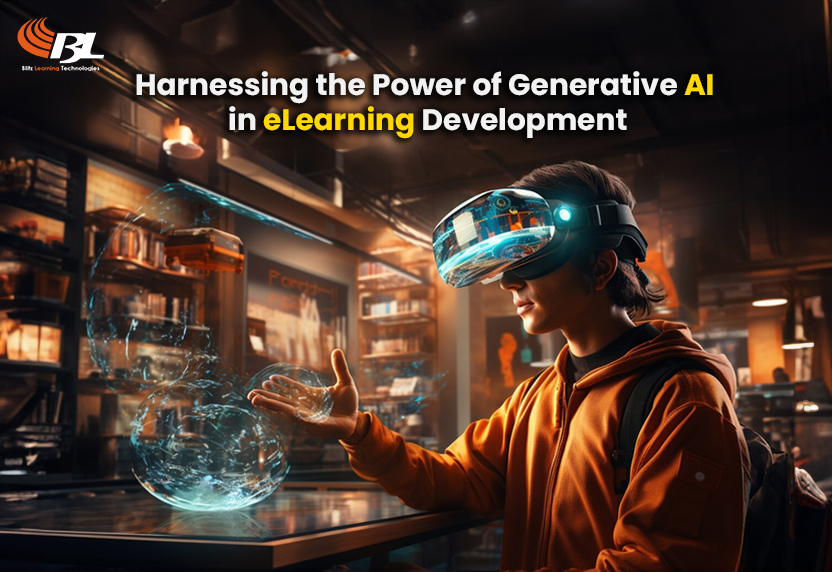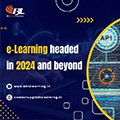
Blog
- Home
- Blog

23Jul
Harnessing the Power of Generative AI in eLearning Development
Introduction:
In the rapidly evolving landscape of education and training, the integration of technology has become more than just a trend; it's a necessity. One of the most transformative technologies making waves in eLearning development is Generative Artificial Intelligence (AI). This powerful tool is revolutionizing how educational content is created, delivered, and personalized, offering unprecedented opportunities to enhance learning outcomes and engagement.
Understanding Generative AI in eLearning:
Generative AI refers to technologies that enable machines to produce content that is indistinguishable from what humans create. This includes text, images, videos, and even interactive simulations. In the context of eLearning, generative AI can:-
Content Creation: Automatically generate text-based content such as quizzes, summaries, and explanations based on educational material. This reduces the time and effort required by instructional designers and subject matter experts.
Personalization: Tailor learning experiences to individual needs by creating adaptive learning paths and content that responds to the learner's pace, preferences, and performance data.
Multimedia Generation: Create visual and interactive elements like videos, infographics, and simulations that enhance comprehension and engagement.
Language Translation: Facilitate global accessibility by translating educational content into multiple languages quickly and accurately.
Benefits of Integrating Generative AI in eLearning:
1. Efficiency and Scalability: Traditional eLearning development can be time-consuming and resource intensive. Generative AI automates repetitive tasks such as content creation and localization, allowing organizations to scale their eLearning initiatives efficiently. This means faster deployment of courses and updates, keeping content fresh and relevant.
2. Personalized Learning Experiences: Every learner has unique strengths, weaknesses, and learning preferences. Generative AI enables the creation of personalized learning paths and content recommendations based on real-time performance data and user interactions. This adaptive learning approach improves engagement and knowledge retention by delivering content in a way that resonates with each learner.
3. Enhanced Content Quality: Generative AI can assist in maintaining content consistency and quality across different modules and courses. It can generate high-quality, error-free text and media elements, ensuring that learners receive accurate and up-to-date information.
4. Accessibility and Inclusivity: By automating tasks like language translation and text-to-speech synthesis, generative AI helps make eLearning content accessible to diverse audiences, including non-native speakers and individuals with disabilities. This promotes inclusivity and expands the reach of educational initiatives.
Challenges and Considerations:
While generative AI holds immense promise for eLearning, there are considerations that organizations must address:-
Quality Control: Ensuring that AI-generated content meets educational standards and is accurate and relevant.
Ethical Use: Respecting copyright laws and ethical guidelines when using AI to generate and distribute content.
User Acceptance: Ensuring that learners are comfortable with AI-driven interactions and perceive them as valuable enhancements rather than replacements for human instructors.
The Future of eLearning with Generative AI:
As generative AI continues to evolve, its potential in eLearning will only grow. Future advancements may include more sophisticated natural language processing capabilities, real-time learning analytics, and the integration of AI with virtual and augmented reality for immersive learning experiences.
Conclusion:
In conclusion, integrating generative AI into eLearning development has the power to transform how educational content is created, personalized, and delivered. By leveraging this technology responsibly and strategically, organizations can create more engaging, effective, and inclusive learning experiences that meet the diverse needs of learners worldwide. As we navigate this exciting frontier, collaboration between educators, technologists, and learners will be key to unlocking the full potential of generative AI in education.
Remember, the journey of learning is not just about acquiring knowledge but also about adapting to new technologies that can enrich the learning experience. Generative AI is one such technology poised to make a significant impact on the future of eLearning.

Neti
About authorNeti is a dynamic professional with a diverse background in human resources, operations, and personality development training. Recognized as a transformative leader, she empowers others as a sought-after mentor, leveraging her deep understanding of human behavior. An avid reader and traveler, she applies her global mindset to innovative problem-solving in the e-learning industry, where she leads the development of cutting-edge educational platforms. Her journey exemplifies versatility, resilience, and a commitment to personal and professional growth.



Leave a comments